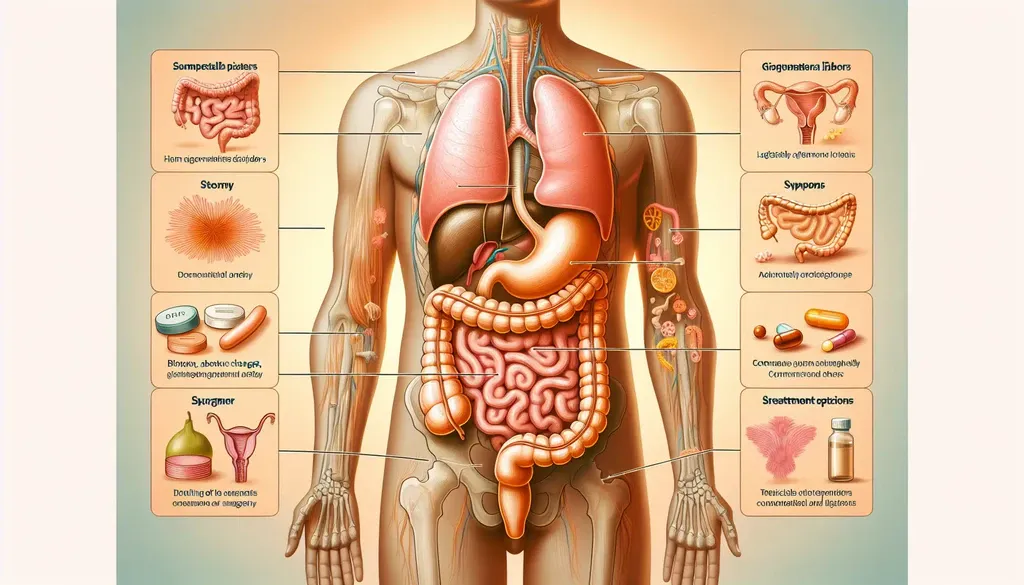Understanding Gastrointestinal Disorders – Symptoms and Treatments
Understanding Gastrointestinal Disorders: Key Symptoms and Effective Treatments

Gastrointestinal (GI) disorders encompass a wide range of conditions that affect the digestive tract, from the esophagus to the rectum. These disorders can impact anyone, regardless of age or lifestyle, and they often present with similar symptoms, making diagnosis challenging. Understanding the common symptoms and available treatments is essential for managing these conditions effectively and improving quality of life.
What Are Gastrointestinal Disorders?
Gastrointestinal disorders refer to diseases and conditions that affect the digestive system. This system includes the mouth, esophagus, stomach, small intestine, large intestine (colon), rectum, and anus, as well as accessory organs like the liver, pancreas, and gallbladder. The digestive tract’s primary function is to break down food, absorb nutrients, and eliminate waste. When this process is disrupted, it can lead to various symptoms and complications.
Common gastrointestinal disorders include:
- Gastroesophageal reflux disease (GERD)
- Irritable bowel syndrome (IBS)
- Inflammatory bowel disease (IBD), including Crohn’s disease and ulcerative colitis
- Celiac disease
- Peptic ulcers
- Gallstones
- Diverticulitis
- Constipation and diarrhea
Common Symptoms of Gastrointestinal Disorders
Since the digestive system is complex and interconnected, symptoms can vary widely depending on the specific disorder and the part of the GI tract affected. However, some symptoms are common across many gastrointestinal conditions:
- Abdominal pain and cramping: One of the most frequent complaints, abdominal pain can range from mild discomfort to severe, debilitating pain.
- Bloating and gas: These symptoms often indicate difficulties with digestion or absorption.
- Diarrhea and constipation: Changes in bowel habits are common in many GI disorders. Diarrhea may be frequent, loose, and watery, while constipation is characterized by infrequent or difficult bowel movements.
- Heartburn or acid reflux: A burning sensation in the chest or throat caused by stomach acid flowing back into the esophagus.
- Nausea and vomiting: These symptoms can occur in several GI disorders, often associated with infections, inflammation, or obstruction.
- Unintended weight loss: This may suggest malabsorption or a more serious underlying condition.
- Fatigue: Often related to chronic inflammation, anemia, or nutrient deficiencies.
- Blood in stool: Can indicate bleeding anywhere in the digestive tract and requires immediate medical attention.
Common Gastrointestinal Disorders and Their Treatments
1. Gastroesophageal Reflux Disease (GERD)
Symptoms: Heartburn, regurgitation, chest pain, difficulty swallowing, chronic cough.
Causes: Weakness of the lower esophageal sphincter allows stomach acid to reflux into the esophagus.
Treatment: Lifestyle changes such as avoiding trigger foods (spicy, fatty foods, caffeine), eating smaller meals, and not lying down immediately after eating. Medications include antacids, H2 blockers, and proton pump inhibitors (PPIs). In severe cases, surgery may be necessary.
2. Irritable Bowel Syndrome (IBS)
Symptoms: Abdominal pain, bloating, diarrhea, constipation, or alternating bowel habits.
Causes: The exact cause is unknown but thought to involve gut-brain interaction, sensitivity to certain foods, and stress.
Treatment: Dietary changes like a low FODMAP diet, stress management, and medications to relieve specific symptoms such as antispasmodics, laxatives, or antidiarrheals. Probiotics can also be helpful.
3. Inflammatory Bowel Disease (IBD)
Symptoms: Chronic diarrhea, abdominal pain, fatigue, weight loss, and sometimes bleeding.
Types: Crohn’s disease and ulcerative colitis.
Causes: An autoimmune response causing chronic inflammation of the GI tract.
Treatment: Anti-inflammatory drugs, immune system suppressors, biologics, and sometimes surgery to remove damaged portions of the intestines. Nutritional support is important.
4. Celiac Disease
Symptoms: Diarrhea, bloating, gas, fatigue, anemia, and sometimes skin rash.
Causes: An autoimmune reaction to gluten, a protein found in wheat, barley, and rye.
Treatment: Strict lifelong gluten-free diet leads to symptom resolution and intestinal healing.
5. Peptic Ulcers
Symptoms: Burning stomach pain, bloating, heartburn, nausea.
Causes: Helicobacter pylori infection or long-term use of NSAIDs.
Treatment: Antibiotics to eradicate H. pylori, acid reducers like PPIs, and lifestyle changes to avoid irritation.
6. Gallstones
Symptoms: Sudden and intense pain in the upper right abdomen, nausea, vomiting.
Causes: Hardened deposits of digestive fluid in the gallbladder.
Treatment: Often surgery (cholecystectomy) to remove the gallbladder. Dietary adjustments may help manage symptoms before surgery.
7. Diverticulitis
Symptoms: Abdominal pain (usually left lower side), fever, nausea, constipation or diarrhea.
Causes: Inflammation or infection of small pouches (diverticula) in the colon wall.
Treatment: Antibiotics, liquid diets during flare-ups, and sometimes surgery for severe cases.
When to See a Doctor
Persistent or severe gastrointestinal symptoms should always prompt a visit to a healthcare provider. Warning signs include:
- Severe abdominal pain
- Blood in stool or vomit
- Unexplained weight loss
- Difficulty swallowing
- Persistent vomiting or diarrhea
- Signs of dehydration
Early diagnosis and treatment can prevent complications and improve outcomes.
Lifestyle Tips for Maintaining Digestive Health
- Eat a balanced diet rich in fiber from fruits, vegetables, and whole grains.
- Stay hydrated by drinking plenty of water.
- Exercise regularly to promote healthy digestion.
- Avoid excessive alcohol and smoking.
- Manage stress through relaxation techniques such as yoga or meditation.
- Maintain a healthy weight.
Conclusion
Gastrointestinal disorders affect millions worldwide and can significantly impact daily life. Understanding the symptoms and treatment options is crucial for managing these conditions effectively. While some GI disorders require long-term management, many can be controlled with lifestyle changes and medication. If you experience persistent digestive symptoms, consult a healthcare professional to receive an accurate diagnosis and appropriate care. With the right approach, it is possible to maintain digestive health and lead a comfortable, active life.

